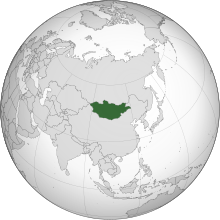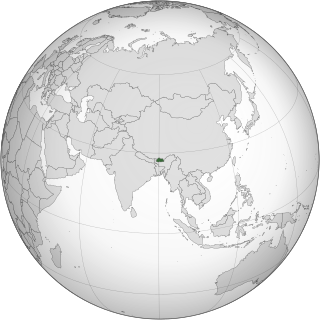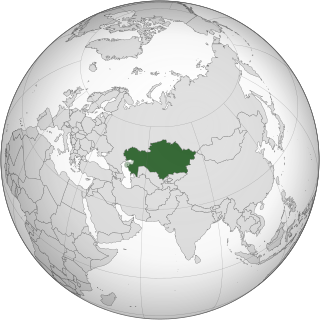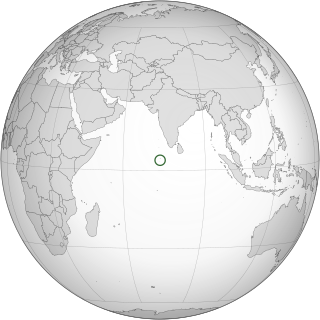 Location of Mongolia (dark green) | |
| Medicinal | Illegal |
|---|---|
| Recreational | Illegal |
Cannabis is illegal in Mongolia. In 2008, most of the cannabis seized in Mongolia was grown locally, though some was produced in Russia. [1]
 Location of Mongolia (dark green) | |
| Medicinal | Illegal |
|---|---|
| Recreational | Illegal |
Cannabis is illegal in Mongolia. In 2008, most of the cannabis seized in Mongolia was grown locally, though some was produced in Russia. [1]
Cannabis may have been introduced to Mongolia by the Scythians, and historically was used for medical and shamanic purposes. [2]

Cannabis, also known as marijuana or weed, among other names, is a non-chemically uniform drug from the cannabis plant. Native to Central or South Asia, the cannabis plant has been used as a drug for both recreational and entheogenic purposes and in various traditional medicines for centuries. Tetrahydrocannabinol (THC) is the main psychoactive component of cannabis, which is one of the 483 known compounds in the plant, including at least 65 other cannabinoids, such as cannabidiol (CBD). Cannabis can be used by smoking, vaporizing, within food, or as an extract.

Cannabis in Papua New Guinea is illegal, but the nation is a significant producer and consumer of cannabis. Cannabis is sometimes called spak brus in local parlance.

Cannabis in Chile is illegal for all production and public consumption, though private at-home consumption, grow and selling is allowed for medical use. It is widely consumed, with the highest per-capita use in Latin America. In 2014 Chile began clinical trials on medical marijuana, and in 2015 a decriminalization bill successfully passed the lower house of the Chilean Congress.
The list includes and details significant events that occurred in the global history of national-level implementations of, or changes made to, laws surrounding the use, sale, or production of the psychoactive drug cannabis.

Cannabis in Bhutan is illegal, but grows prolifically in the country and has multiple traditional uses, such as feeding pigs and producing textiles.
Cannabis is illegal in Benin. The country is not a major drug producer or consumer, but increasingly serves as a transshipment point for drugs produced elsewhere. Cannabis is the only drug produced locally in Benin, though mostly on a small scale.
Cannabis in Lesotho is a traditional crop that remains illegal for any use, but largely tolerated. The plant is known as matekoane in Sesotho language but also called khomo ea fatše, likata or kakana.
Cannabis in Grenada is illegal. Cannabis possession is the most common drug offense on the island, and the annual prevalence of cannabis use amongst adults was reported as 10.8% in 2005.
Cannabis in New Caledonia is illegal, but is cultivated illicitly. Sources note that "hard drugs" are rare in New Caledonia, and their drug issues are primarily confined to cannabis, with local Kanak chiefs being anti-drug and working to eradicate cannabis plantations.
Cannabis in French Guiana is illegal, but is illicitly cultivated and transported.
Cannabis in São Tomé and Principe is illegal, but is trafficked illicitly. In the 1890s, Portuguese Angolans sold "notable quantities" to Angolan laborers in São Tomé, despite cannabis growing prolifically in the vicinity of the laborers' quarters.

Cannabis in Yemen is illegal. Cannabis is less common in Yemen than khat.
Cannabis in Ghana is illegal without license from the Minister of Health, but the nation is, along with Nigeria, among the top illicit cannabis-producing countries of West Africa. Cannabis in Ghana is known as weed or devil's tobacco.
Cannabis in Senegal is illegal; the drug is locally referred to as yamba.
Cannabis in Mali is illegal.

Cannabis in Kazakhstan is illegal.
Cannabis is illegal in Angola. The drug is locally referred to as diamba or liamba.
Cannabis in Saint Vincent and the Grenadines was prior known to be illegal but is now decriminalized up to 2 ounces. Persons caught with 56 grammes or less of the drug will not be subject to incarceration. Instead, they will be fined a maximum of $500 and be subject to other measures including begin given educational material about cannabis; counselling and rehabilitative care. These provisions were among several amendments that were made to the Drugs Amendment Act (2018), which was passed in Parliament on July 25. In addition to only being a ticketable offense, the amendment provides for Vincentians to smoke the herb in the privacy of their homes and in places of worship of the Rastafarian faith without punishment. The amendment also said that the Minister may designate a list of public areas where the smoking of cannabis may be allowed. The country has correlating legal medical marijuana laws. Parliament on December 11, 2018, passed two Acts, one which establishes a Medical Cannabis Industry in St Vincent and the Grenadines and the other which offers amnesty for traditional marijuana growers. The Vincentian Parliament passed legislation to protect the intellectual property of breeders of new plant varieties in St. Vincent and the Grenadines (SVG), the Plant Breeders’ Protection Bill, 2019. It sets up the jurisprudential framework within which these persons will be able to accrue the rights, how these rights will be protected, how they will be published so that persons in the entire society, in the court and globally, can be aware of the hard work which was done, the agriculture minister said. Under the law, a person must obtain the authorization of a grantee with respect to propagating material of the protected variety, to produce or reproduce, condition the material for the purpose of propagation, offer the material for sale, to sell the material, import or export the material, or stock the material for any of the previous purposes. Regarding infringement of plant breeders’ rights, the following acts are exempt: an act done privately for non-commercial purposes, an act done for experimental purposes, or an act done for the purpose of breeding other plant varieties. The law allows for compulsory licenses where a person may apply to the court for the grant of a compulsory license to exploit a protected variety in SVG. Subject to terms that the court thinks fit, the court may make an order for the grant of compulsory licenses if it is satisfied that the grant of the compulsory licenses is in the public interest. Offense under the law include falsification of register and falsely representing a plant variety as a protected variety. The law also orders the registrar to publish applications for plant breeders’ rights, proposed and approved denominations, withdrawals of application for plant breeders’ rights, the rejection of applications for plant breeders’ rights, any grant of a breeders’ right, any change in the breeder or the agent in respect of a plant variety, lapses of plant breeders’ rights, any invalidation or revocation of a plant breeder's rights, the licenses in relation to plant breeders’ rights, where applicable. Cannabis is widely grown illicitly on the island and is the nation's most valuable agricultural product. Saint Vincent is the most prolific producer of cannabis in the Caribbean, other than Jamaica.
Cannabis in the Republic of the Congo is illegal. Cannabis is known locally as mbanga.

Cannabis is illegal in the Maldives.